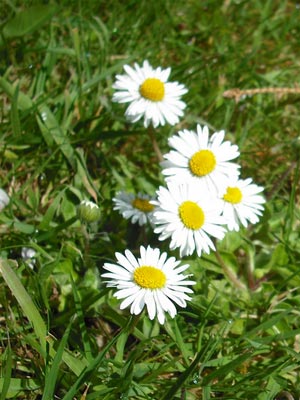Chaucer too celebrates this month, together with his favourite flower, the daisy. In a Prologue to his “The Legend of Good Women”, after explaining his devotion to reading and study, he anticipates by four hundred years Wordsworth’s abandonment of books for Nature, as related in our March programme. Chaucer writes:
And as for me, though than I konne but lyte,
On bokes for to rede I me delyte
And in my herte have hem in reverence
So hertely, that there is game noon
That fro my bokes maketh me to goon,
But it be seldom, on the holiday;
Save certainly, whan comen is the May
Whan that I here the smale foules singe
And that the floures ginnen for to springe,
Farwel my bok, and my devocioun!
Now have I than swich a condicioun,
That, of alle the floures in the mede,
Than love I most these floures whyte and rede,
Swich as men callen daisies in our town.
To hem have I so greet affeccioun,
As I seyde erst, whan comen is the May,
That in my bed ther daweth me no day
That I nam up, and walking in the mede
To see this flour agein the sonne sprede
On bokes for to rede I me delyte
And in my herte have hem in reverence
So hertely, that there is game noon
That fro my bokes maketh me to goon,
But it be seldom, on the holiday;
Save certainly, whan comen is the May
Whan that I here the smale foules singe
And that the floures ginnen for to springe,
Farwel my bok, and my devocioun!
Now have I than swich a condicioun,
That, of alle the floures in the mede,
Than love I most these floures whyte and rede,
Swich as men callen daisies in our town.
To hem have I so greet affeccioun,
As I seyde erst, whan comen is the May,
That in my bed ther daweth me no day
That I nam up, and walking in the mede
To see this flour agein the sonne sprede
Previous poem from the Fairy Queen by Edmund Spenser
Next Poem from Knight of the Burning Pestle by Beaumont and Fletcher
Next Poem from Knight of the Burning Pestle by Beaumont and Fletcher
